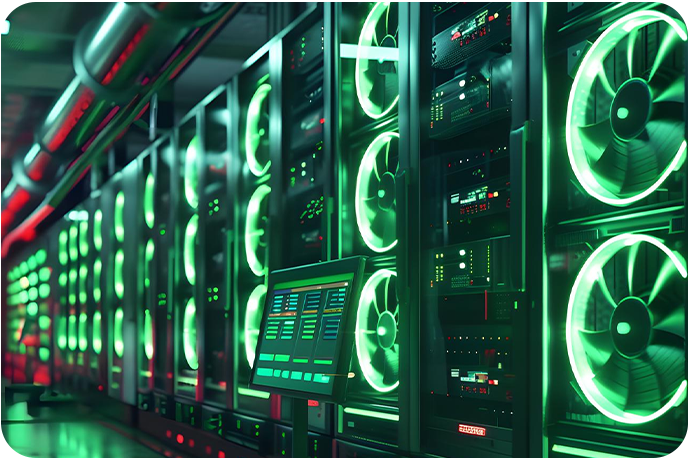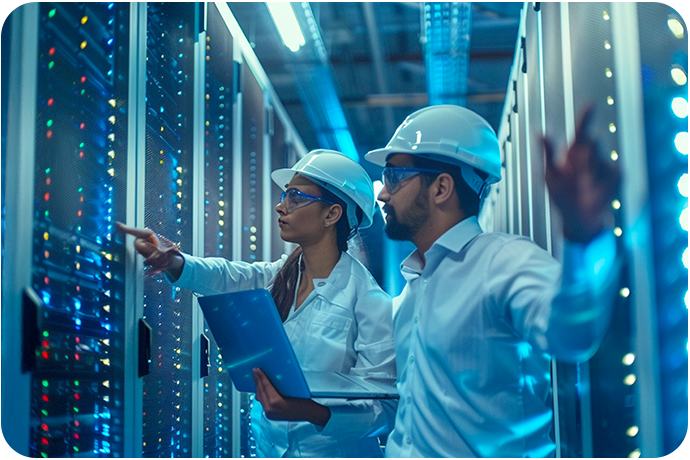Data Center
Data Center
The Future of Colocation Hosting: Emerging Trends Transforming Data Centers in 2025

As digital transformation accelerates and enterprises expand their hybrid IT strategies, colocation hosting is undergoing a significant evolution. Colocation is no longer about just rack space, power & connectivity – it has evolved into a critical enabler of cloud-native agility, AI-driven workloads, ESG compliance, and edge-ready infrastructure. With global AI workloads projected to grow by 25–35% annually through 2027 (Bain & Company), colocation data centers must now support high-density GPU clusters, real-time data processing, and ultra-low-latency connectivity. The industry is evolving with next-gen facilities, intelligent automation, and sustainable operations tailored to the demands of modern enterprises.
AI-Ready Colocation: The Rise of High-Density Infrastructure
One of the most transformative shifts in colocation hosting is the rise of high-performance computing (HPC) infrastructure. The explosion of generative AI, large language models, and real-time analytics is pushing colocation providers to adopt high-density racks with liquid cooling, advanced thermal management, and low-latency connectivity. GPU clusters and bare metal AI training workloads are increasingly being deployed in colocation environments that are optimised for high-density operations and scalable interconnects.
Colocation facilities must now support up to 100kW+ per rack densities, driven by AI and HPC use cases. Data Centers are now transitioning from traditional air-cooled setups to hybrid and direct-to-chip liquid cooling systems. This shift not only improves performance and energy efficiency but also enables enterprises to cut model training times by half, accelerating time to market and delivering a critical competitive edge in AI-driven innovation.
The Sustainability Imperative
As power consumption in data centers rises, sustainability is no longer optional it is a business imperative.. Enterprises have to meet ESG goals, and colocation providers are expected to align their infrastructure and operations with sustainability priorities. The future belongs to data centers that can guarantee green power, achieve low PUE (Power Usage Effectiveness) scores, and offer transparency in carbon reporting.
From on-site solar and wind power integration to 100% green energy sourcing options and innovative battery backup systems, colocation hosts are transforming into energy-conscious digital ecosystems.
Rise of Edge-Ready, Interconnected Ecosystems
Colocation is also moving closer to end-users, driven by the growing need for low-latency, high-bandwidth edge computing. In sectors like fintech, retail, gaming, and autonomous systems, the ability to process data in near real-time is business-critical. This is fueling the rise of modular, containerised, and regionally distributed micro-data centers that bring compute power to the edge.
Carrier-neutral colocation providers are building dense, software-defined connectivity fabrics that enable direct, private interconnects between enterprises, cloud platforms, SaaS providers, and ISPs. One can expect widespread adoption of on-demand interconnection services, giving enterprises plug-and-play access to global cloud on-ramps, AI platforms, and low-latency cross-connects that power distributed applications and real-time data flows.
Automation, AI Ops, and Digital Twins
Colocation operations are becoming smarter and more efficient, thanks to the deep integration of AI, automation, and advanced DCIM (Data Center Infrastructure Management) tools. Predictive maintenance powered by machine learning helps preempt hardware failures, while AI-driven energy management systems dynamically adjust power and cooling to IT load minimizing energy waste and operational costs.
Digital twin technology is now widely used for real-time simulation, capacity planning, and lifecycle management. These AI-powered replicas of physical infrastructure enable data centers to model equipment placement, refine thermal design, and proactively identify scalability constraints before they impact performance.
Environmental factors like temperature, humidity, and airflow are continuously analysed to optimize rack-level efficiency and prevent overheating, while AR-assisted interfaces are beginning to support remote diagnostics and on-site coordination. Remote monitoring, robotic inspections, and real-time dashboards now provide granular visibility into power usage, environmental metrics, carbon footprint, and equipment health.
Security and Compliance by Design
According to Grand View Research, the global data center security market was valued at $18.42 billion in 2024 and is expected to grow at a CAGR of 16.8% between 2025 and 2030. With increasing cyber risks and stringent data localisation laws, security and compliance have become foundational to colocation services. Providers are investing heavily in physical security, biometric access controls, air-gapped zones, and continuous surveillance. Certifications like ISO 27001, PCI DSS, and Uptime Tier IV are business enablers.
Modern colocation facilities are also integrating zero-trust architectures, sovereign cloud zones, and encryption-as-a-service offerings. As data regulations become stricter, especially in financial and healthcare sectors, enterprises are turning to colocation partners that can offer built-in compliance.
Yotta Data Services: Pioneering India’s Colocation Future
Yotta Data Services is at the forefront of building and operating the country’s largest and most advanced data center parks. Strategically located across Navi Mumbai, Greater Noida, and Gujarat, Yotta’s facilities are engineered for scale, efficiency and digital sovereignty – making them ideal for enterprises embracing AI, cloud, and high-performance computing.
With a design PUE as low as 1.4, Yotta integrates green energy and intelligent infrastructure to deliver high-density colocation that supports demanding AI workloads. Its sovereign data centers also host Shakti Cloud, India’s powerful AI cloud platform, ensuring performance, compliance, and data locality.
Yotta’s multi-tenant colocation services offer highly customisable options from single rack units (1U, 2U, and more) to full server cages, suites, and dedicated floors. These are housed in state-of-the-art environments with robust power redundancy, advanced cooling, fire protection, and environmental controls – delivering enterprise-grade reliability, energy efficiency, and cost-effectiveness to support the digital ambitions of tomorrow.




















